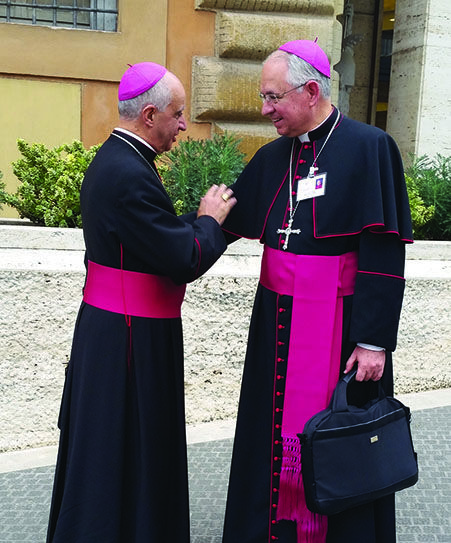I am writing to you again this week from Rome, at the start of the second week of the Synod of Bishops on the family, which will run for two more weeks, when Pope Francis will celebrate the closing Mass on Oct. 25.
There are nearly 300 bishops here from every continent, and many priests, religious and lay people assisting them and the work of the synod.
It’s a beautiful experience for me of the universal nature, the “catholicity” of the Church. You really get to see that the Church herself is the “family of God” — made up of people from every nation in the world.
As you can imagine, all of us bring different experiences and opinions to the Synod Hall. We can get in the habit of thinking that “the Church” is whatever we experience in our own parish or our own corner of the world. But the Church is bigger than our own experience, something you see very clearly at the synod, when you are able to talk to representatives from the Church in Africa, Asia, Latin America, Europe and Australia.
The work of the synod is divided into small groups according to language. There are three French groups, three Italian, two Spanish and one German. I am working in one of the four English-language groups. My group alone reflects the diversity and universality of the synod — there are 21 bishops, along with auditors, experts and fraternal delegates from 20 different countries!
We are working, line-by-line, sometimes word-by-word, through the document prepared to guide our discussions, which is called the Instrumentum Laboris.
It is important to remember that “synod” means assembly. It is not like a legislature or even a city council. Our work is to provide insight and counsel. We are here because Pope Francis has asked us to advise him on some of the crucial issues confronting married couples and families today.
And it is important to keep in mind that we are not “voting” on Church teaching or discussing ways to change it.
At the end of the extraordinary synod last year, Pope Francis said there will be no “putting into question the fundamental truths of the sacrament of marriage: the indissolubility, the unity, the faithfulness, the fruitfulness, the openness to life.” And he has continued to emphasize that during this synod process.
Pope Francis is attending and listening carefully in our general sessions and I have to say, it is an extraordinary feeling to be in the presence of the Vicar of Christ as we are reflecting on the Church’s mission and the needs of the family of God.
In my first intervention at the synod last week, I spoke to the Holy Father and the Synod Fathers about the need for the Church to proclaim from a solid biblical and theological foundation.
The Word of God reveals our creator’s plan for his creation and for human history. This divine Word is the authentic starting point for understanding the family’s vocation and mission.
The synod’s Instrumentum Laboris recognizes that we can discern a “divine pedagogy” in the history of salvation that unfolds in the sacred Scriptures.
To strengthen marriage and the family in our time, I believe the Church must recover the divine pedagogy found in the Scriptures. Just a few weeks ago, when he was in the United States, Pope Francis reminded us again — that God entrusted his loving plan for creation to the family.
As I see it, the crisis of the family in our time is, to some extent, a crisis of anthropology. Our culture has lost its sense of the meaning of the human person and creation. This loss is rooted in the loss of God.
In the face of this crisis, I believe the Church must present a new evangelical catechesis on creation, as an essential element of the new evangelization. We must proclaim the beauty of God’s plan of love for creation, for the human person, and for the human family. Our new evangelization must proclaim an integral human ecology that reveals the nature, vocation and teleology of the human person as created by God.
And I believe the Church needs to recover and reflect on the “family” images found in the Scriptures and most ancient tradition, and in the universal Church’s liturgy and popular piety: the human person as the imago Dei; the Church as the mother of believers and the “family of God”; the family as the “domestic Church”; and the Christian life as spiritual childhood of sons and daughters of God.
In the face of the widespread crisis of the family, I believe our society needs to hear once more the beautiful truth about the human person and God’s loving plan for creation and history, a plan that is centered in the family.
So keep praying for the synod this week and let’s pray for each other.
And let’s ask the intercession of the Holy Family to help us to illuminate, by our pastoral priorities and practice, how the family is the crucial “way” for the Church and for God’s plan for creation.
You can follow Archbishop Gomez daily via Facebook, Twitter and Instagram.

